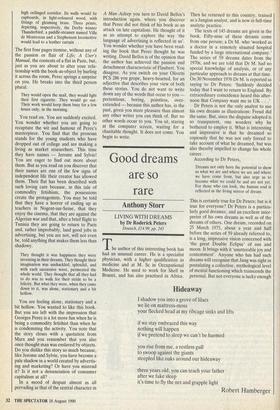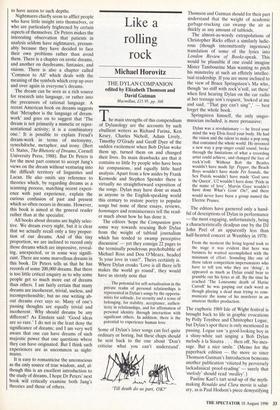Good dreams are so rare
Anthony Storr
LIVING WITH DREAMS by Dr Roderick Peters Deutsch, £14.99, pp. 243 The author of this interesting book has had an unusual career. He is a specialist physician, with a higher qualification in medicine and at M. Sc in Occupational Medicine. He used to work for Shell in Brunei, and has also practised in Africa.
Then he returned to this country, trained as a Jungian analyst, and is now in full-time analytic practice.
The texts of 145 dreams are given in the book. Fifty-nine of these dreams come from one person; a Dr M. who 'worked as a doctor in a remotely situated hospital funded by a large international company.' The series of 59 dreams dates from the 1970s, and we are told that Dr M. had no special knowledge of analysis, or of any particular approach to dreams at that time. On 30 November 1976 Dr M. is reported as saying to Dr Peters: 'Suddenly decided today that I want to return to England. By extraordinary coincidence heard this after- noon that Company want me in UK . .
Dr Peters is not the only analyst to use his own dreams as illustrations: Freud did the same. But, since the disguise adopted is so transparent, one wonders why he bothered to employ it. What is interesting and impressive is that he dreamed so copiously that he was not only forced to take account of what he dreamed, but was also thereby impelled to change his whole career.
According to Dr Peters,
Dreams not only have the potential to show us what we are and where we are and where we have come from, but also urge us to become what we could be and are not yet. For those who can look, the human soul is reflected in the living mirror of dream.
This is certainly true for Dr Peters; but is it true for everyone? Dr Peters is a particu- larly good dreamer, and an excellent inter- preter of his own dreams as well as of the dreams of others. One dream, recorded on 25 March 1975, about a year and half before the series of 59 already referred to, is a long, impressive vision concerned with 'the great Double Eclipse' of sun and moon. It brings with it 'unutterable joy and contentment'. Anyone who has had such dreams will recognise that Jung was right in postulating a collective, mythological level of mental functioning which transcends the personal. But not everyone is lucky enough to have access to such depths.
Nightmares chiefly seem to afflict people who have little insight into themselves, or who are particularly frightened by certain aspects of themselves. Dr Peters makes the interesting observation that patients in analysis seldom have nightmares, presum- ably because they have decided to face their own problems rather than avoid them. There is a chapter on erotic dreams, and another on daydreams, fantasies, and visions. There is also a chapter called 'Common to All' which deals with the meaning of the symbols which crop up over and over again in everyone's dreams.
The dream can be seen as a rich source for research into language, or rather into the precursors of rational language. A recent American book on dreams suggests that 'Metaphor is the language of dream- work' and goes on to suggest that 'The dream is not primarily a mimetic or repre- sentational activity; it is a combinatory one.' It is possible to explain Freud's dream-work in terms of metonymy, synechdoche, metaphor, and irony. (Bert 0. States, The Rhetoric of Dreams, Cornell University Press, 1988). But Dr Peters is for the most part content to accept Jung's views on the dream without venturing into the difficult territory of linguistics and Lacan. He also omits any reference to theories which, by regarding dreams as a scanning process, matching recent experi- ence with past experience, explain the curious confusion of past and present which so often occurs in dreams. However, this book is aimed at the general reader rather than at the specialist.
All books about dreams are highly selec- tive. We dream every night, but it is clear that we actually recall only a tiny propor- tion of our dreams. And of this tiny proportion, we are inclined to record only those dreams which are impressive, reveal- ing, unexpected, or in some way signifi- cant. There are some marvellous dreams in this book. Dr Peters tells us that he has records of some 200,000 dreams. But there is too little critical enquiry as to why some people get so much more out of dreams than others. I am fairly certain that many dreams are incoherent, trivial, useless, and incomprehensible; but no one writing ab- out dreams ever says so. Many of one's passing thoughts are equally trivial and incoherent. Why should dreams be any different? As Einstein said: 'Good ideas are so rare.' I do not in the least deny the significance of dreams; and I am very well aware that one can have dreams of such majestic power that one questions where they can have originated. But I think such experiences are as uncommon as night- mares.
It is easy to romanticise the unconscious as the only source of true wisdom, and, al- though this is an excellent introduction to the study of dreams, I hope Dr Peters' next book will critically examine both Jung's theories and those of others.



























































 Previous page
Previous page